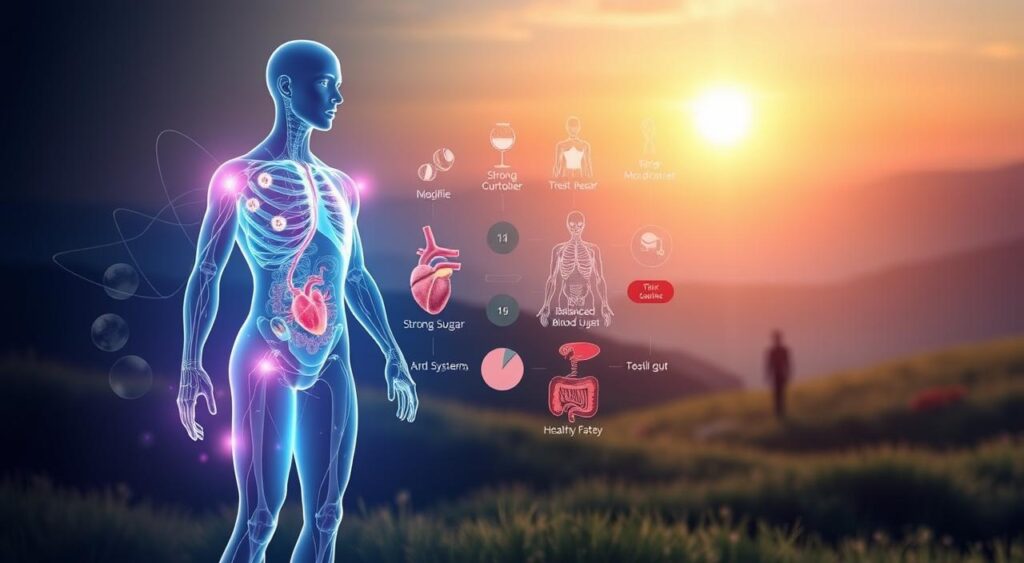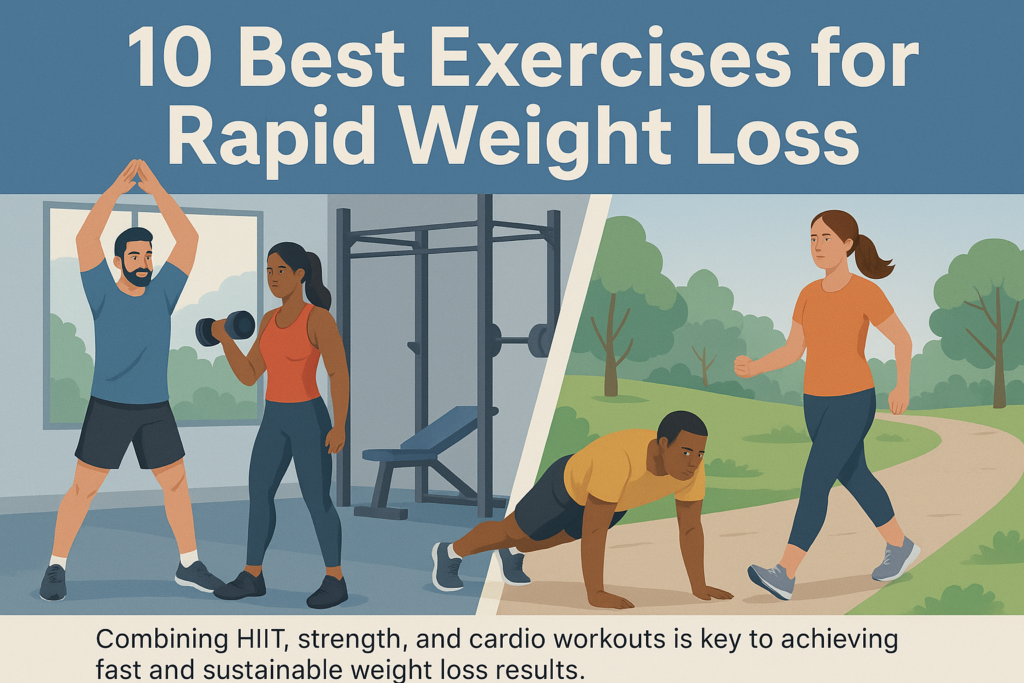Ever wondered why some people choose intermittent fasting, while others prefer daily calorie deficit for weight loss? This article compares the 30-day results of these two methods. It aims to show you the real differences and help you choose the best option for you.
Recent studies have found that intermittent fasting can lead to an average weight loss of -7.6%. This is compared to -5% for those following daily calorie restrictions. These findings suggest that intermittent fasting might offer more benefits. Let’s dive into how each method affects calorie deficit weight loss and help you make a choice that fits your lifestyle.
Understanding Intermittent Fasting Basics
Intermittent fasting is a flexible diet that focuses on when you eat, not what. It involves alternating between eating and fasting periods. Many find it helps with weight management and overall health.
What is Intermittent Fasting?
Intermittent fasting means eating only during certain hours. The 16/8 method is popular, where you fast for 16 hours and eat for 8. Alternate-day fasting is another option, where you alternate between fasting and eating days. These methods fit into various lifestyles.
Popular Methods of Intermittent Fasting
- 16/8 Method: Fast for 16 hours, eat during an 8-hour window.
- 5:2 Diet: Eat normally for five days and limit calorie intake to 500-600 calories on two days.
- Eat-Stop-Eat: Involves fasting for 24 hours once or twice a week.
- Warrior Diet: Eat small amounts of raw fruits and vegetables during the day, then enjoy one large meal at night.
Benefits of Intermittent Fasting
Intermittent fasting offers many benefits, like better fat loss and improved metabolic health. It can also lower the risk of chronic diseases. Many people also report better mental clarity and overall wellness.
Daily Calorie Deficit: A Closer Look
Creating a daily calorie deficit is key for weight control. When you eat fewer calories than you burn, your body uses fat for energy. This leads to weight loss. Understanding this is the first step to successful weight loss.
How Does a Calorie Deficit Work?
A calorie deficit is about energy balance. It happens when you eat less than your body burns. This makes your body use fat for energy, causing weight loss. Knowing how to create a calorie deficit is important for effective weight loss.
Calculating Your Daily Caloric Needs
To make a calorie deficit, you need to know your daily caloric needs. Your age, gender, weight, height, and activity level all play a part. The Harris-Benedict equation is a good tool to estimate your needs. Use this to set your calorie intake goals for weight loss.
Common Mistakes to Avoid
When trying to lose weight, some mistakes can slow you down. Not tracking your calories can make it hard to see progress. Skipping nutrient-rich foods can also harm your health. Avoiding these mistakes can help you lose weight successfully.
Comparing Weight Loss Strategies
When looking at ways to lose weight, it’s key to know how different methods affect your metabolism. Intermittent fasting and daily calorie deficit have their own benefits. Recent studies show intermittent fasting can boost your metabolic rate, leading to fat loss. Knowing how each method works can help you choose the best for your health.
How Intermittent Fasting Affects Metabolism
Intermittent fasting can change your metabolism to burn fat more efficiently. Studies show it can increase your metabolic rate through hormonal changes. This makes it a popular choice for losing weight compared to traditional diets.
Daily Calorie Deficit and Fat Loss
Eating fewer calories than you burn is a common weight loss strategy. But, it’s important to watch how calorie restriction affects your metabolism. Prolonged calorie restriction can slow your metabolism, making it harder to lose more weight. This can lead to plateaus and frustration, showing the need for a balanced approach.
Personal Preferences and Consistency
Your success with these strategies depends on your personal preferences and staying consistent. Some prefer the structured eating of intermittent fasting, while others like the flexibility of a daily calorie deficit. Finding a method that fits your lifestyle is key to staying motivated and achieving long-term success.
Health Benefits of Intermittent Fasting
Intermittent fasting is more than just a way to lose weight. It’s also good for your overall health. Knowing these benefits can help you choose better foods.
Impact on Insulin Sensitivity
One big plus of intermittent fasting is how it boosts insulin sensitivity. This helps control blood sugar levels. It might even prevent type 2 diabetes.
Research shows that fasting can improve how your body handles glucose. This leads to better blood sugar levels.
Benefits for Heart Health
Intermittent fasting is also great for your heart. It can lower cholesterol and triglycerides. This makes your heart health better, reducing the risk of heart disease.
Mental Clarity and Focus
Fasting can also make your mind sharper. It increases BDNF, which is good for your brain. People fasting often find they can focus better and handle tough tasks.

Health Benefits of Daily Calorie Deficit
Starting a daily calorie deficit can help you lose weight in a healthy way. By eating fewer calories than you burn, you start losing fat slowly. Knowing how calorie deficit affects your health can keep you motivated.
Supporting Sustainable Weight Loss
A daily calorie deficit helps your body use fat for energy, leading to weight loss. This method is easy to stick to because you can choose what you eat. It helps you build healthy habits that last.
Possible Health Improvements
Being in a calorie deficit can also improve your health. You might see better heart health and a lower risk of heart problems. Plus, your metabolism and insulin sensitivity could get better, boosting your overall health.
Risks and Considerations
When you’re in a calorie deficit, watch out for risks. It’s important to not cut calories too much, or you might miss out on important nutrients. A smart plan balances your calorie intake and health goals.
30-Day Challenges: What to Expect
Starting a 30-day challenge, like intermittent fasting or daily calorie deficit, can change your life. It’s important to set goals that fit your health needs. This way, you can achieve lasting success, as seen in many success stories.
Setting Realistic Goals
When you begin, make sure your goals are reachable. Think about your fitness level, how much time you have, and what you like. Good strategies for setting goals include:
- Setting clear targets, like losing a certain amount of weight or body fat
- Planning your meals for fasting or calorie intake
- Adding fun physical activities to go with your diet changes
Tracking Your Progress Effectively
Keeping track of your progress boosts your motivation. Use tools like food diaries or apps to log your meals and workouts. Looking back at your progress can reveal what works best for you. Here are ways to track well:
- Write down what you eat each day, including how hungry you feel and your energy
- Take weekly weight and body measurements
- Check your progress often to adjust your goals if needed

Real-Life Success Stories
Many people have changed their lives with intermittent fasting and calorie deficit. Their stories show how these methods can help with weight loss and better health. Each tale offers a glimpse into the challenges and victories, inspiring others to try.
Case Studies on Intermittent Fasting Results
Various individuals have shared their success with intermittent fasting. For example, a woman lost 20 pounds with a 16:8 fasting schedule. She also noticed a big boost in her energy.
Another person tried the 5:2 method, eating less on two days a week. He lost 15 pounds, enjoying more flexibility in his diet. This change helped him make lasting lifestyle improvements.
Daily Calorie Deficit Transformations
Many have achieved their weight goals with daily calorie deficit. One person lost over 25 pounds in three months. He focused on eating whole foods and controlling portions.
A young professional also saw big changes with calorie deficit. She combined exercise with mindful eating. In six months, she lost about 30 pounds, feeling more confident and healthy.
Common Misconceptions
Understanding the differences between intermittent fasting and traditional dieting can clear up common misconceptions. Many believe intermittent fasting is not for everyone or leads to overeating. But, these beliefs hide the benefits and flexibility of fasting. Also, myths about calorie deficits say they cause severe hunger and are hard to follow. It’s key to know the truth to make smart diet choices.
Myths About Intermittent Fasting
One big myth is that intermittent fasting always means overeating during eating times. This myth says our bodies can’t control hunger. But, studies show many people eat well within their eating windows without overdoing it.
- It’s often thought that intermittent fasting is bad for active people.
- Some believe fasting slows down metabolism, but studies disagree.
- Another myth is that fasting causes nutrient deficiencies, but proper meal planning can prevent this.
Misunderstanding Calorie Deficits
Many think calorie deficits mean constant hunger and hard dieting. But, it’s possible to have a calorie deficit with balanced, nutritious meals. Eating foods like vegetables and lean proteins can help you feel full while losing weight.
| Myth | Truth |
|---|---|
| Fasting always leads to overeating. | Many people manage their portions well within eating windows. |
| Calorie deficits cause severe hunger. | Good meals can keep you full and manage hunger better. |
| Intermittent fasting is not suitable for everyone. | With some adjustments, many can fit fasting into their lives. |
By knowing the truth about calorie deficits and intermittent fasting, you can explore weight-loss methods with confidence. For more insights, check out the Annals of Internal Medicine findings.

Nutritional Considerations
Starting intermittent fasting or a daily calorie deficit? Choosing the right foods is key. The best foods for fasting support your body and let you enjoy meals. Balancing nutrients and vitamins helps you stay on track.
Best Foods to Eat While Intermittent Fasting
For the most benefits from fasting, add these foods to your diet:
- Whole grains: Quinoa and brown rice give you energy and nutrients.
- Lean proteins: Chicken, turkey, and tofu help keep muscles strong.
- Fruits and vegetables: Different colors mean more vitamins and minerals.
- Healthy fats: Avocados, nuts, and olive oil keep you full.
Maintaining Nutritional Balance in a Calorie Deficit
On a calorie deficit, eat nutrient-rich foods. This keeps your vitamins and minerals up. Here’s how to stay balanced while losing weight:
- Choose whole foods over processed ones for more nutrients.
- Balance your meals with carbs, proteins, and fats.
- Drink plenty of water to stay hydrated and control hunger.
- Time your meals with your fasting windows for best results.
The Psychological Impact
Dieting is more than just losing weight. Your mindset is key to reaching your diet goals. A positive attitude helps you stay strong and focused, whether you’re fasting or cutting calories. This mindset change can make your diet journey more successful and lasting.
Mindset Shifts for Success
Your mental approach greatly affects your dieting path. Focus on your wins, not your failures. Use visualization to see the good outcomes of your efforts. This positive thinking makes facing challenges easier and helps you choose healthier options.
Building Sustainable Habits
Building lasting diet habits is essential. Instead of strict rules, aim for flexibility. Start with small, easy changes that fit your life. This could be swapping bad snacks for good ones or adjusting your meal times. Consistency builds a healthy food relationship and boosts your diet’s psychological benefits.

Combining Strategies for Optimal Results
Using both intermittent fasting and a calorie deficit can boost your weight loss. This mix uses the best of both worlds. It lets you create a plan that fits your life perfectly.
How to Integrate Intermittent Fasting with a Calorie Deficit
To blend these methods, match your fasting times with your calorie intake. Pick fasting periods that work for you and eat within your calorie limit. Keeping track of calories during meals helps burn fat. Here are some tips:
- Plan your meals to fit your fasting and calorie goals.
- Use apps or journals to track your food intake.
- Try different fasting lengths to find what suits you.
Tailoring Your Plan for Best Outcomes
Your success depends on making the plan your own. Consider your activity level, food likes, and weight loss goals. Here’s how to customize:
- Find the right daily calorie range for you.
- Adjust fasting times to manage hunger and energy.
- Choose foods that are filling yet low in calories.
Conclusion: Which is Right for You?
As we finish our look at intermittent fasting and daily calorie deficit, it’s key to think about what we’ve learned. Both methods have their own benefits. Intermittent fasting helps you stick to a schedule, while daily calorie deficit helps you control portions and eat mindfully.
Studies show both ways can help you lose weight and feel better. Now, think about which one fits your life and likes better. Some people see quick weight loss with intermittent fasting. Others prefer daily calorie deficit for lasting changes.
Choosing between these methods is a personal decision. You might pick one or mix them. Knowing what works for you is the first step to better health. Use the knowledge we’ve shared to make your choice and start your journey with confidence.



